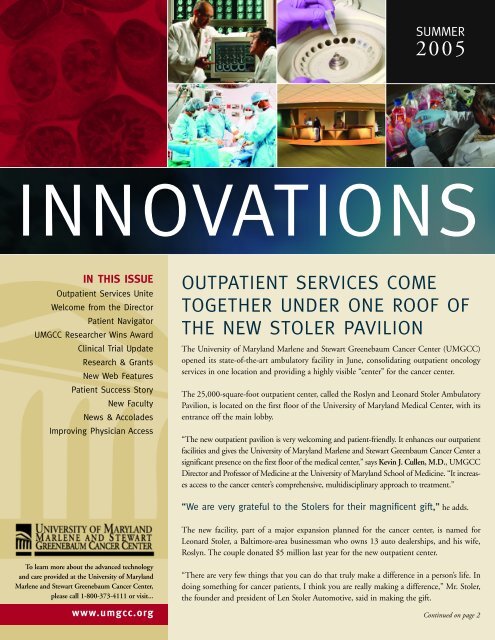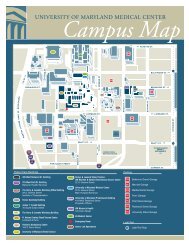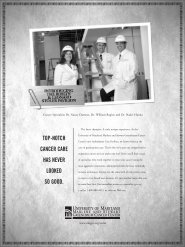Innovations - University of Maryland Greenebaum Cancer Center
Innovations - University of Maryland Greenebaum Cancer Center
Innovations - University of Maryland Greenebaum Cancer Center
You also want an ePaper? Increase the reach of your titles
YUMPU automatically turns print PDFs into web optimized ePapers that Google loves.
SUMMER<br />
2005<br />
INNOVATIONS<br />
IN THIS ISSUE<br />
Outpatient Services Unite<br />
Welcome from the Director<br />
Patient Navigator<br />
UMGCC Researcher Wins Award<br />
Clinical Trial Update<br />
Research & Grants<br />
New Web Features<br />
Patient Success Story<br />
New Faculty<br />
News & Accolades<br />
Improving Physician Access<br />
OUTPATIENT SERVICES COME<br />
TOGETHER UNDER ONE ROOF OF<br />
THE NEW STOLER PAVILION<br />
The <strong>University</strong> <strong>of</strong> <strong>Maryland</strong> Marlene and Stewart <strong>Greenebaum</strong> <strong>Cancer</strong> <strong>Center</strong> (UMGCC)<br />
opened its state-<strong>of</strong>-the-art ambulatory facility in June, consolidating outpatient oncology<br />
services in one location and providing a highly visible “center” for the cancer center.<br />
The 25,000-square-foot outpatient center, called the Roslyn and Leonard Stoler Ambulatory<br />
Pavilion, is located on the first floor <strong>of</strong> the <strong>University</strong> <strong>of</strong> <strong>Maryland</strong> Medical <strong>Center</strong>, with its<br />
entrance <strong>of</strong>f the main lobby.<br />
“The new outpatient pavilion is very welcoming and patient-friendly. It enhances our outpatient<br />
facilities and gives the <strong>University</strong> <strong>of</strong> <strong>Maryland</strong> Marlene and Stewart Greenbaum <strong>Cancer</strong> <strong>Center</strong> a<br />
significant presence on the first floor <strong>of</strong> the medical center,” says Kevin J. Cullen, M.D., UMGCC<br />
Director and Pr<strong>of</strong>essor <strong>of</strong> Medicine at the <strong>University</strong> <strong>of</strong> <strong>Maryland</strong> School <strong>of</strong> Medicine. “It increases<br />
access to the cancer center’s comprehensive, multidisciplinary approach to treatment.”<br />
“We are very grateful to the Stolers for their magnificent gift,” he adds.<br />
The new facility, part <strong>of</strong> a major expansion planned for the cancer center, is named for<br />
Leonard Stoler, a Baltimore-area businessman who owns 13 auto dealerships, and his wife,<br />
Roslyn. The couple donated $5 million last year for the new outpatient center.<br />
To learn more about the advanced technology<br />
and care provided at the <strong>University</strong> <strong>of</strong> <strong>Maryland</strong><br />
Marlene and Stewart <strong>Greenebaum</strong> <strong>Cancer</strong> <strong>Center</strong>,<br />
please call 1-800-373-4111 or visit...<br />
www.umgcc.org<br />
“There are very few things that you can do that truly make a difference in a person’s life. In<br />
doing something for cancer patients, I think you are really making a difference,” Mr. Stoler,<br />
the founder and president <strong>of</strong> Len Stoler Automotive, said in making the gift.<br />
Continued on page 2
WELCOME FROM<br />
THE DIRECTOR<br />
At the <strong>University</strong> <strong>of</strong> <strong>Maryland</strong> Marlene and Stewart <strong>Greenebaum</strong><br />
<strong>Cancer</strong> <strong>Center</strong>, we’re changing the face <strong>of</strong> cancer. We are excited to<br />
share some <strong>of</strong> these changes with you in this issue <strong>of</strong> <strong>Innovations</strong>,<br />
which has received a facelift <strong>of</strong> its own.<br />
This June, one <strong>of</strong> our most visible changes took place as we opened<br />
the Roslyn and Leonard Stoler Ambulatory Pavilion. This 25,000<br />
square foot facility located just inside the main entrance <strong>of</strong> the<br />
<strong>University</strong> <strong>of</strong> <strong>Maryland</strong> Medical <strong>Center</strong>, gives a new look to the<br />
excellent patient care we provide at UMGCC. With patient comfort<br />
and ease <strong>of</strong> access at the forefront <strong>of</strong> our architectural plans, the<br />
Stoler Pavilion is a centralized location for outpatient services.<br />
Another visible change to the cancer center is our website. A new<br />
design and a new domain name – UMGCC.org – make the plethora<br />
<strong>of</strong> information for patients and physicians easier to find and is more<br />
complete than ever before.<br />
Less visible but unquestionably important examples <strong>of</strong> how we are<br />
changing cancer care lay in the developments and advances in our<br />
clinical and research programs. For example, a new trial involving<br />
vaccine treatment for men with rising PSA levels following diagnosis<br />
and treatment <strong>of</strong> prostate cancer has begun, as has a trial evaluating<br />
combination therapy with Velcade for the treatment <strong>of</strong> lung cancer.<br />
New telemedicine capabilities make access to our expertise here in<br />
Baltimore and our other resources, such as clinical trials, easier for<br />
community oncologists, as you will read in the patient success story.<br />
I am very pleased to inform you that Angela Brodie, Ph.D., pr<strong>of</strong>essor<br />
<strong>of</strong> pharmacology and experimental therapeutics, has been<br />
awarded the very prestigious General Motors Kettering Prize for<br />
cancer research for her work in the development <strong>of</strong> aromatase<br />
inhibitors. Her research has led to a new class <strong>of</strong> drugs that help<br />
prevent women who have completed breast cancer treatment from<br />
relapsing. Dr. Brodie is one <strong>of</strong> our leading investigators in our newly<br />
reorganized hormone responsive cancers research program, where<br />
investigators are focused on breast and prostate cancer.<br />
For more information about any <strong>of</strong> the content included in this<br />
newsletter, or to learn more about UMGCC, please call us at<br />
1-800-373-4111 or visit www.umgcc.org.<br />
Director, <strong>University</strong> <strong>of</strong> <strong>Maryland</strong> Marlene and Stewart <strong>Greenebaum</strong><br />
<strong>Cancer</strong> <strong>Center</strong> and Pr<strong>of</strong>essor <strong>of</strong> Medicine, <strong>University</strong> <strong>of</strong> <strong>Maryland</strong><br />
School <strong>of</strong> Medicine<br />
OUTPATIENT SERVICES COME TOGETHER<br />
UNDER ONE ROOF OF THE NEW STOLER<br />
PAVILION Continued from page 1.<br />
Barry Meisenberg, M.D., UMGCC Deputy Director <strong>of</strong> Clinical<br />
Affairs and pr<strong>of</strong>essor <strong>of</strong> medicine at the <strong>University</strong> <strong>of</strong> <strong>Maryland</strong><br />
School <strong>of</strong> Medicine, says, “The Stoler Pavilion gives our patients and<br />
staff a true sense <strong>of</strong> the <strong>University</strong> <strong>of</strong> <strong>Maryland</strong> Marlene and Stewart<br />
<strong>Greenebaum</strong> <strong>Cancer</strong> <strong>Center</strong> as a ‘center’ for cancer care. It brings<br />
together outpatient services that were located in several different<br />
areas.”<br />
The Stoler Pavilion houses the medical oncology and the bone marrow/<br />
stem cell transplantation exam rooms, and clinic areas for multidisciplinary<br />
programs. It also provides support services, such as social work and<br />
nutrition counseling, as well as patient education space.<br />
The Stoler Pavilion has 28 exam rooms, an infusion therapy center<br />
featuring flat screen monitors and internet access in its 22 treatment<br />
bays and three treatment rooms, a phlebotomy room, conference<br />
rooms with telemedicine capabilities, meeting rooms and a pharmacy<br />
specific to the infusion center. Elevators link the new pavilion<br />
directly to the cancer center’s inpatient units and <strong>of</strong>fices on the<br />
eighth and ninth floors.<br />
“The clinical area is designed around our multidisciplinary approach to<br />
diagnosing and treating cancer patients,” says Mark Krasna, M.D.,<br />
UMGCC Associate Director and pr<strong>of</strong>essor <strong>of</strong> surgery. “The exam<br />
rooms are clustered in pods with meeting rooms where our teams <strong>of</strong><br />
doctors can discuss the best treatment options for patients. New<br />
patients will be able to see a surgeon, radiation oncologist and medical<br />
oncologist without having to leave the pavilion. They will then<br />
come back to the Stoler Pavilion for treatment and follow-up visits.”<br />
“Having everything in one central location is a much more efficient way<br />
<strong>of</strong> meeting the needs <strong>of</strong> our patients and their families,” says Mohan<br />
Suntha, M.D., UMGCC Associate Director for Multidisciplinary<br />
Programs and Outreach and associate pr<strong>of</strong>essor <strong>of</strong> radiation oncology.<br />
“It will be a comfortable place for patients as well as for the physicians,<br />
nurses and other members <strong>of</strong> the cancer center staff.”<br />
The Stoler Pavilion is a key part <strong>of</strong> a major expansion <strong>of</strong> the cancer<br />
center’s clinical and research facilities. Additional inpatient beds are<br />
being added to support the cancer center's growth. UMGCC is also<br />
undertaking a major expansion <strong>of</strong> its research laboratory space.<br />
For more information about the Roslyn and Leonard Stoler Pavilion,<br />
please visit www.umgcc.org or call 1-800-373-4111.<br />
2 | INNOVATIONS
Above: One new feaure <strong>of</strong> the Roslyn and Leonard Stoler Pavilion, depicted<br />
above, is a patient navigator.<br />
PATIENT NAVIGATOR<br />
Everything in the Roslyn and Leonard Stoler Pavilion is new. The<br />
carpet. The exam rooms. The registration desk. But one new<br />
feature <strong>of</strong> the pavilion might not be so quickly recognized – the<br />
Patient Navigator.<br />
UMGCC has partnered with the American <strong>Cancer</strong> Society to provide<br />
a patient navigator for patients who may need assistance in<br />
reaching their appointment locations or accessing information or<br />
other resources that will help them with their care.<br />
“When patients learn they have been diagnosed with cancer, it can<br />
<strong>of</strong>ten be overwhelming,” explains Kevin Cullen, M.D., director <strong>of</strong> the<br />
cancer center. In many cases, patients do not have all the support<br />
systems they will need as they start the diagnosis and treatment<br />
process. “Issues such as transportation or not knowing how to organize<br />
and coordinate the logistics around their care can lead to some<br />
patients falling through the cracks,” he continues. The patient<br />
navigator will team up with these patients and help them not only<br />
learn what resources are available to them, but help them make use<br />
<strong>of</strong> those resources.<br />
The patient navigator will help patients connect with support services<br />
such as nutrition and social work, arrange transportation and child<br />
care, obtain financial assistance and access any additional resources that<br />
will help them through their cancer treatments.<br />
“The navigator will ensure patients are better able to adhere to their<br />
treatment plan and help them benefit from all <strong>of</strong> the services available<br />
through UMGCC and the American <strong>Cancer</strong> Society that they may<br />
have otherwise not know about,” adds Dr. Cullen.<br />
To obtain additional information about the Patient Navigator at<br />
UMGCC, please call 1-800-373-4111 or visit www.umgcc.org.<br />
UMGCC RESEARCHER<br />
AWARDED PRESTIGIOUS<br />
KETTERING PRIZE<br />
Angela Brodie, Ph.D., has been named this<br />
year's recipient <strong>of</strong> the Kettering Prize from<br />
the General Motors <strong>Cancer</strong> Research<br />
Awards (GMCRA). The Kettering Prize is<br />
awarded for the most outstanding recent<br />
contribution to the diagnosis or treatment<br />
<strong>of</strong> cancer. Dr. Brodie is pr<strong>of</strong>essor <strong>of</strong> pharmacology<br />
and experimental therapeutics at the<br />
<strong>University</strong> <strong>of</strong> <strong>Maryland</strong> School <strong>of</strong> Medicine<br />
and a researcher at the <strong>University</strong> <strong>of</strong><br />
<strong>Maryland</strong> Marlene and Stewart <strong>Greenebaum</strong> <strong>Cancer</strong> <strong>Center</strong> in the<br />
Hormone Responsive <strong>Cancer</strong>s Program.<br />
The award honors Dr. Brodie's pioneering work in the development<br />
<strong>of</strong> aromatase inhibitors. This class <strong>of</strong> drugs, now in use worldwide,<br />
represents perhaps the most important advance in the treatment <strong>of</strong><br />
breast cancer in the last two decades.<br />
Formestane was the first selective aromatase inhibitor to be used clinically,<br />
and at that time was the only new drug specifically designed<br />
for the treatment <strong>of</strong> breast cancer in 10 years. It was released for<br />
worldwide use in 1994. More recently, in 2003 letrozole was found<br />
to be so effective in early breast cancer after five years <strong>of</strong> tamoxifen<br />
that a recent clinical trial was stopped early so that patients who had<br />
been taking the placebo could be given the new drug.<br />
Today, many thousands <strong>of</strong> women worldwide now benefit from the<br />
outstanding work <strong>of</strong> Dr. Brodie and her team.<br />
The GMCRA awards include the Kettering Prize, the Mott Prize for<br />
epidemiology and the Sloan Prize for basic science. Together, they are<br />
among the most prestigious awards in all <strong>of</strong> science. Dr. Brodie joins<br />
105 previous awardees, 12 <strong>of</strong> whom subsequently won the Nobel<br />
Prize. She and the other laureates lectured at the GMCRA annual scientific<br />
conference held at the NIH June 14-18. Most appropriately,<br />
the topic <strong>of</strong> this year’s conference was breast cancer. She formally<br />
received the award at a gala in Washington, DC, on June 15.<br />
SUMMER 2005 | 3
CLINICAL TRIAL UPDATE<br />
NEW VACCINE STUDY UNDERWAY FOR<br />
MEN WITH RISING PSA LEVELS<br />
The <strong>University</strong> <strong>of</strong> <strong>Maryland</strong> Marlene and Stewart <strong>Greenebaum</strong><br />
<strong>Cancer</strong> <strong>Center</strong>’s Genitourinary Oncology Program and the <strong>University</strong><br />
<strong>of</strong> <strong>Maryland</strong> Division <strong>of</strong> Urology have opened one <strong>of</strong> the nation’s first<br />
clinical trials studying the effects <strong>of</strong> a prostate specific antigen (PSA)<br />
vaccine on the immune system <strong>of</strong> men diagnosed with recurrent prostate<br />
cancer. If the PSA vaccine boosts the T lymphocyte immune response<br />
in this Phase II study, clinicians may have a treatment option to <strong>of</strong>fer<br />
patients who are at risk for developing metastatic prostate cancer.<br />
To Richard Alexander, M.D., principal investigator <strong>of</strong> the study,<br />
chief <strong>of</strong> the Baltimore Veterans Affairs Medical <strong>Center</strong> Urology<br />
Service and associate pr<strong>of</strong>essor at the <strong>University</strong> <strong>of</strong> <strong>Maryland</strong> School<br />
<strong>of</strong> Medicine, the need for an effective treatment for men with<br />
advanced prostate cancer is clear: “30,000 men die <strong>of</strong> prostate cancer<br />
each year and they die <strong>of</strong> metastatic disease.” Many men with<br />
Clinicians know that men with elevated PSA levels after surgery have<br />
a higher rate <strong>of</strong> disease recurrence and death compared to those with<br />
undetectable PSA levels. What they don’t know, however, is what<br />
happens in the time that passes between surgery and identification <strong>of</strong><br />
metastatic disease. For an average <strong>of</strong> eight years, men with detectable<br />
and rising PSA levels present with no other symptoms <strong>of</strong> disease and<br />
are generally healthy. Clinicians see this window – during which there<br />
are currently no treatment options – as the opportune time to use the<br />
body as its own defense and mount an immunologic response to halt<br />
progression <strong>of</strong> the remaining cancerous cells.<br />
“It is now firmly established that cancerous tumors contain antigens<br />
that can be specifically recognized by the immune system and this<br />
recognition can be exploited as therapeutic,” introduces Dr.<br />
Alexander. “We hope to stimulate the immune system to destroy<br />
prostatic cancerous cells throughout the body before they develop<br />
enough for us to identify metastatic disease,” he remarks.<br />
“30,000 men die <strong>of</strong> prostate cancer each year<br />
and they die <strong>of</strong> metastatic disease.”<br />
prostate cancer are essentially cured when their localized disease is<br />
treated, but effective therapy doesn’t exist to treat the cancer when it<br />
advances. “The very patients who have prostate cancer that will most<br />
likely shorten their lives and who need our help the most are the ones<br />
for whom we can do the least,” he notes.<br />
Men at risk for metastatic disease are identified by a rise in PSA levels<br />
after surgery is performed. Usually, elevated levels <strong>of</strong> PSA are secreted<br />
by a man’s prostatic epithelium when one <strong>of</strong> a few conditions <strong>of</strong><br />
prostate develop, most notably cancer. If the PSA levels do indeed<br />
point to cancer and not a benign condition, the patient may choose<br />
to undergo a radical prostatectomy. “Since PSA is specific for the<br />
prostate gland, if the entire prostate gland is removed, then PSA<br />
should fall to undetectable or female levels,” explains Nancy<br />
Dawson, M.D., co-investigator for the study, director <strong>of</strong> the genitourinary<br />
medical oncology program and pr<strong>of</strong>essor <strong>of</strong> medicine.<br />
“The presence <strong>of</strong> elevated PSA levels in a man after radical prostatectomy,<br />
especially within one year <strong>of</strong> surgery, suggests that he has<br />
prostatic epithelial cells, either benign or malignant, remaining<br />
somewhere in his body,” she adds.<br />
The PSA peptide, called PSA: 154-163(155L), will be administered<br />
subcutaneously with adjuvant Montanide® ISA-51 on an outpatient<br />
basis every other week for four doses, then every four weeks for three<br />
doses. Patients eligible for the trial must have undergone radical<br />
prostatectomy at least three months prior to enrollment, have<br />
detectable and rising PSA levels (> 0.6 ng/ml) over three months, have<br />
received no radiation or hormonal therapy and have a life expectancy<br />
<strong>of</strong> greater than one year.<br />
Effects <strong>of</strong> the vaccine will be gauged by the increase in peptide-specific<br />
T cells in peripheral blood collected at the baseline and one week<br />
after the last dose <strong>of</strong> the vaccine. A positive response is considered<br />
either a five-fold increase in specific T cells in patients who had significant<br />
baseline numbers or the presence <strong>of</strong> cells in patients who did<br />
not. A decline in serum PSA <strong>of</strong> at least 50% compared to baseline<br />
will also be considered a positive response.<br />
To learn more about this trial, refer a patient you think may be a candidate<br />
or find out what other trials are currently underway at the <strong>University</strong><br />
<strong>of</strong> <strong>Maryland</strong> Marlene and Stewart <strong>Greenebaum</strong> <strong>Cancer</strong> <strong>Center</strong>, please<br />
call 1-800-373-4111 or visit www.umgcc.org.<br />
4 | INNOVATIONS
EVALUATING NOVEL COMBINATION THERAPY WITH<br />
VELCADE FOR STAGE III LUNG CANCER PATIENTS<br />
Oncologists at the <strong>University</strong> <strong>of</strong> <strong>Maryland</strong> Marlene and Stewart<br />
<strong>Greenebaum</strong> <strong>Cancer</strong> <strong>Center</strong> have begun enrolling patients in a Phase<br />
I clinical trial evaluating treatment <strong>of</strong> Stage III non-small cell lung<br />
cancer with Velcade in combination with standard chemotherapy and<br />
radiation therapy.<br />
Velcade, a proteasome inhibitor, was approved by the FDA in 2003<br />
for the treatment <strong>of</strong> multiple myeloma. The drug blocks proteasomes,<br />
which play a roll in the growth and survival <strong>of</strong> cells. When the<br />
enzymes are blocked, cancer cells die.<br />
“Velcade has been shown to boost the effectiveness <strong>of</strong> radiation in laboratory<br />
studies, but it has never been combined with radiation to treat<br />
patients with non-small cell lung cancer. We were the first institution<br />
to test this new combination therapy,” notes Martin J. Edelman,<br />
M.D., director <strong>of</strong> thoracic medical oncology and the study’s principal<br />
investigator at UMGCC. Dr. Edelman is an associate pr<strong>of</strong>essor <strong>of</strong><br />
medicine at the <strong>University</strong> <strong>of</strong> <strong>Maryland</strong> School <strong>of</strong> Medicine.<br />
Patients enrolled in the study will receive paclitaxal and carboplatin in<br />
addition to radiation therapy and Velcade for six weeks. After this<br />
initial treatment, surgery will be considered for patients whose tumors<br />
are small enough. Standard chemotherapy will be <strong>of</strong>fered to nonsurgical<br />
candidates and to patients following surgery.<br />
“We know that combining chemotherapy and radiation can aid some<br />
people with lung cancer and the combination clearly improves<br />
survival rates compared with radiation or surgery alone.<br />
Chemotherapy and radiation, followed by surgery, may be an even<br />
better treatment option for certain patients,” Dr. Edelman explains.<br />
“We want to find out if a newer agent, such as Velcade, can enhance the<br />
value <strong>of</strong> radiation or chemotherapy in treating this type <strong>of</strong> lung cancer.”<br />
Co-investigators <strong>of</strong> this study include Mohan Suntharalingam,<br />
M.D., vice chairman and associate pr<strong>of</strong>essor <strong>of</strong> radiation oncology at<br />
the <strong>University</strong> <strong>of</strong> <strong>Maryland</strong> School <strong>of</strong> Medicine, and King F. Kwong,<br />
M.D., a thoracic surgeon and assistant pr<strong>of</strong>essor <strong>of</strong> surgery.<br />
“This study builds on the <strong>University</strong> <strong>of</strong> <strong>Maryland</strong>’s expertise in the<br />
multi-modality treatment <strong>of</strong> non-small cell lung cancer,” Dr.<br />
Edelman says. It is one <strong>of</strong> more than a dozen current clinical trials<br />
ongoing for patients with lung cancer.<br />
For more information, call 1-800-373-4111 or visit www.umgcc.org.<br />
Left: A <strong>Cancer</strong><br />
<strong>Center</strong> researcher<br />
works in his lab.<br />
RESEARCH & GRANTS<br />
RESEARCH INITIATIVES COMBINE TO FORM HORMONE<br />
RESPONSIVE CANCERS PROGRAM<br />
The <strong>University</strong> <strong>of</strong> <strong>Maryland</strong> Marlene and Stewart <strong>Greenebaum</strong> <strong>Cancer</strong><br />
<strong>Center</strong>’s Breast <strong>Cancer</strong> and Prostate <strong>Cancer</strong> research programs recently<br />
merged to become the Hormone Responsive <strong>Cancer</strong>s (HRC) Program.<br />
Combining breast and prostate research into one program takes full<br />
advantage <strong>of</strong> the fact that the hormone response mechanism <strong>of</strong> estrogen<br />
and testosterone are very similar in many respects. This new combined<br />
program ties outstanding investigators in breast and prostate cancer<br />
together (including Dr. Angela Brodie, featured on page 3), enabling<br />
easier sharing <strong>of</strong> discoveries and advances made in the laboratory and<br />
quicker development <strong>of</strong> innovative approaches to diagnosis, treatment<br />
and prevention <strong>of</strong> malignancies <strong>of</strong> the reproductive system.<br />
The Hormone Responsive <strong>Cancer</strong>s Program is home to many projects<br />
that are directed toward the identification <strong>of</strong> novel or overexpressed<br />
molecules that can serve as new biomarkers, aid in diagnosis,<br />
improve existing treatments and function as targets for novel therapies.<br />
The HRC program has five major focus areas including hormone and<br />
peptide growth factors, biology <strong>of</strong> tumor angiogenesis, drug resistance<br />
and apoptosis, immunotherapy and tumor invasion and metastasis.<br />
NEW WEB FEATURES<br />
The <strong>University</strong> <strong>of</strong> <strong>Maryland</strong> Marlene and Stewart <strong>Greenebaum</strong><br />
<strong>Cancer</strong> <strong>Center</strong> website has a new look – and a new name. With<br />
great information for cancer patients and practitioners alike,<br />
www.umgcc.org is a site to be bookmarked.<br />
New navigation and an area dedicated exclusively to oncologists are<br />
two new components to www.umgcc.org. Patient success stories, up<br />
to date information on clinical trials and email links to some <strong>of</strong> our<br />
physicians are all features on the website.<br />
Please visit us at www.umgcc.org.<br />
SUMMER 2005 | 5
PATIENT SUCCESS STORY<br />
TELEMEDICINE LINKS CANCER EXPERTS<br />
IN COORDINATING PATIENT'S CARE<br />
When Leonard (Lenny) Fishbein received his diagnosis <strong>of</strong> advanced<br />
lung cancer three years ago, his odds <strong>of</strong> survival were not good. At<br />
age 72, he had been a smoker for over 50 years. Despite regular<br />
chest X-rays, his lung cancer had gone undetected, and was now<br />
stage IV, meaning that it had spread to another part <strong>of</strong> his body. In<br />
fact, neurological symptoms, specifically tremors on the right side<br />
<strong>of</strong> his body, were what originally sent him to the doctor.<br />
“My wife noticed me shaking one day at the kitchen table, and she<br />
insisted I go to a doctor after I admitted I had two other episodes<br />
previously,” says the Rockville, <strong>Maryland</strong> resident. Tests revealed<br />
several lesions on his brain and a small tumor on his lung.<br />
Fishbein’s son, Dr. David M. Fishbein, a gastroenterologist in<br />
Baltimore, recommended a colleague, Mark Krasna, M.D., pr<strong>of</strong>essor<br />
<strong>of</strong> surgery at UMGCC. It was quickly determined that Fishbein’s<br />
brain lesions were the result <strong>of</strong> metastasized lung cancer. His plan <strong>of</strong><br />
care would be two-pronged: first, get rid <strong>of</strong> the lesions on his brain,<br />
and then address the lung cancer.<br />
“My wife noticed me shaking<br />
one day at the kitchen table,<br />
and she insisted I go to a<br />
doctor after I admitted I had<br />
two other episodes previously,”<br />
Fishbein’s oncologist, Dr. J. Garrett Riley, referred him to Luther<br />
Ampey, M.D., medical director <strong>of</strong> the Helen P. Denit <strong>Center</strong> for<br />
Radiation Therapy at Montgomery General Hospital and assistant<br />
pr<strong>of</strong>essor <strong>of</strong> radiation oncology at the <strong>University</strong> <strong>of</strong> <strong>Maryland</strong><br />
School <strong>of</strong> Medicine. Montgomery General is one <strong>of</strong> three affiliated<br />
community radiation oncology centers where <strong>University</strong> <strong>of</strong><br />
<strong>Maryland</strong> physicians and staff provide patient care and are linked<br />
to the oncology specialists at the UMGCC’s downtown Baltimore<br />
campus through a telemedicine link.<br />
Above Left: Lenny Fishbein and his granddaughter.<br />
Above Right: Drs. Regine and Chin discuss a course <strong>of</strong> treatment.<br />
Using state-<strong>of</strong>-the-art telemedicine technology, Dr. Ampey, sitting<br />
in his conference room at Montgomery General, was able to present<br />
Fishbein’s case to his colleagues at UMGCC in Baltimore.<br />
“Videoconferencing allows us to collaborate on how to provide the<br />
best treatment possible. The more minds that you can put to a case,<br />
the more angles can be discussed and pursued,” Dr. Ampey said. “It<br />
makes it a lot easier to coordinate a patient’s care.”<br />
Treatment began with a course <strong>of</strong> whole brain radiation followed<br />
by lung radiation over several weeks at Montgomery General’s radiation<br />
oncology center to shrink the lesions. This was followed by<br />
several months <strong>of</strong> aggressive chemotherapy.<br />
Next was the Gamma Knife <strong>Center</strong> at UMGCC, where Fishbein<br />
met with Lawrence Chin, M.D., associate pr<strong>of</strong>essor <strong>of</strong> neurosurgery<br />
and medical director <strong>of</strong> the Gamma Knife <strong>Center</strong>. He underwent<br />
gamma knife radiosurgery, a procedure that uses high-dose ionizing<br />
radiation to attack the tumor without traditional surgery. Fishbein<br />
was able to go home the next day.<br />
With the brain lesions taken care <strong>of</strong>, he was ready for the treatment team<br />
to address his underlying problem, the primary cancer in his lung. Dr.<br />
Krasna performed minimally-invasive surgery to remove the lesion from<br />
Fishbein’s lung. Says Fishbein, “It was a breeze. I didn’t feel a thing.”<br />
Looking back, Fishbein credits his doctor-son for his good advice, his<br />
local oncologist for his coordination with all the UMGCC doctors,<br />
his daughter-in-law for swiftly setting his appointments and tests,<br />
and his wife for all <strong>of</strong> her support.<br />
Three years later, he appears to have beaten the odds, thanks to cutting-edge<br />
technology for cancer treatment, care by a skilled team <strong>of</strong><br />
specialists, and the technology that linked them all together. Checkups<br />
continue to show him to be disease-free and he’s feeling great. An athletic<br />
lifestyle — he played and coached baseball all his life — and his<br />
comedian sense <strong>of</strong> humor probably played a key role in his recovery.<br />
While he can no longer swing a bat or round third base like he used<br />
to, surviving cancer has been the biggest “win” <strong>of</strong> his life.<br />
6 | INNOVATIONS
NEW FACULTY<br />
SAUL YANOVICH, M.D., HAS JOINED<br />
UMGCC AS CLINICAL DIRECTOR OF<br />
THE BLOOD AND MARROW<br />
TRANSPLANTATION PROGRAM<br />
Saul Yanovich, M.D., a nationally recognized blood and marrow transplant<br />
physician and researcher, has joined the <strong>University</strong> <strong>of</strong> <strong>Maryland</strong><br />
Marlene and Stewart <strong>Greenebaum</strong> <strong>Cancer</strong> <strong>Center</strong> as clinical director<br />
<strong>of</strong> the Blood and Marrow Transplantation (BMT) Program and the<br />
<strong>University</strong> <strong>of</strong> <strong>Maryland</strong> School <strong>of</strong> Medicine as a faculty member.<br />
Most recently the medical director <strong>of</strong> Georgetown <strong>University</strong>’s<br />
Lombardi <strong>Cancer</strong> <strong>Center</strong>’s Bone Marrow Transplant Program<br />
in Washington, D.C., Dr. Yanovich plans to build on the<br />
exceptional patient care provided by its well-established BMT<br />
program and expand the innovative therapies <strong>of</strong>fered through<br />
clinical trials at UMGCC.<br />
Dr. Yanovich is well published in his field and is recognized nationally<br />
for his research and clinical practice in blood and marrow<br />
transplantation. Prior to his appointment at Georgetown, Dr.<br />
Yanovich directed the Bone Marrow Transplantation Unit at the<br />
Medical College <strong>of</strong> Virginia in Richmond.<br />
A graduate <strong>of</strong> Javeriana <strong>University</strong> School <strong>of</strong> Medicine in Bogota,<br />
Colombia, Dr. Yanovich completed his medical residency and<br />
a hematology fellowship at the <strong>University</strong> <strong>of</strong> Miami. He also<br />
completed a research oncology fellowship at the Dana Farber<br />
<strong>Cancer</strong> <strong>Center</strong> Institute <strong>of</strong> Harvard Medical School in Boston.<br />
To contact Dr. Yanovich, please call 1-800-373-4111 or visit our<br />
website at www.umgcc.org.<br />
NEWS &<br />
ACCOLADES<br />
UMGCC MAJOR SUPPORTER OF<br />
SUMMER MYELOMA SEMINAR<br />
The International Myeloma Foundation is<br />
hosting a Patient/Family Seminar in Baltimore,<br />
August 19-20, 2005. UMGCC is a proud<br />
supporter <strong>of</strong> this event, designed to empower<br />
patients and provide current, extensive<br />
information to patients diagnosed with<br />
myeloma and their families. For more information<br />
about this seminar, please visit<br />
www.myeloma.org or call 1-800-373-4111.<br />
BMT TEAM HONORED<br />
The Mildred Mindell <strong>Cancer</strong> Foundation honored<br />
the <strong>University</strong> <strong>of</strong> <strong>Maryland</strong> Marlene and<br />
Stewart <strong>Greenebaum</strong> <strong>Cancer</strong> <strong>Center</strong>'s Blood<br />
and Marrow Transplant (BMT) Team at an<br />
April 3 fundraising event to benefit the transplant<br />
unit. Recognized for their outstanding<br />
efforts in providing cancer care to patients were<br />
Ashraf Z. Badros, M.D., Barry R. Meisenberg,<br />
M.D., and Aaron P. Rapoport, M.D.<br />
DAILY RECORD RECOGNIZES<br />
HEALTH CARE HEROES<br />
The Baltimore City <strong>Cancer</strong> Program was<br />
named the 2005 community outreach winner<br />
<strong>of</strong> the Daily Record’s Health Care Heroes<br />
Award. The program has provided education<br />
and screenings for more than 8,000 women<br />
and identified cancer in 38 since 2001.<br />
Kathy Ruehl, R.N., O.C.N., C.H.T.C., senior<br />
nurse coordinator, was recognized as a Health<br />
Care Hero finalist for her exceptional contributions<br />
to the UMGCC Marrow/Stem Cell<br />
Transplant Program.<br />
FACULTY PRESENTATIONS<br />
AND GRANT AWARDS<br />
Doug Ross, M.D., Ph.D., head <strong>of</strong> developmental<br />
therapeutics at UMGCC, was a<br />
keynote speaker at the 2004 Japanese Society<br />
for the Study <strong>of</strong> Xenobiotics in Kanazawa<br />
Japan. He presented “The Role <strong>of</strong> the ABC<br />
transporter breast cancer resistance protein<br />
(BCRP, ABCG2) in drug disposition” at the<br />
meeting held November 17-19.<br />
Peter Gutierrez, Ph.D., presented information<br />
on his work in proteomics at the first<br />
annual US Human Proteome Organization<br />
Symposium held in Washington, DC<br />
March 13-16, 2005.<br />
Stephen J Meltzer, M.D., director <strong>of</strong> the<br />
Aerodigestive Oncology Program at UMGCC,<br />
was awarded a T-32 GI Training Grant <strong>of</strong><br />
$1.6 million over five years.<br />
Sanford A Stass, M.D., <strong>of</strong> the UMGCC<br />
Experimental Therapeutics Program recently<br />
accepted a five-year $1.5 million grant from the<br />
Biomarkers Reference Laboratories, a section <strong>of</strong><br />
the NCI Early Detection Research Network.<br />
Bruce Line, M.D., and the American Russian<br />
<strong>Cancer</strong> Alliance received a one-year $175,000<br />
grant to further their work transforming<br />
radioactive isotopes from Russian nuclear<br />
stockpiles to cutting-edge cancer therapies.<br />
PATIENT VIDEO SILVER WINNER<br />
Congratulations to the Department <strong>of</strong><br />
Radiation Oncology whose video, A Patient<br />
Guide to Radiation Therapy, was honored with a<br />
silver Aster Award, a national medical marketing<br />
awards program. For a copy <strong>of</strong> this video on<br />
tape or CD, please call 1-800-373-4111.<br />
SUMMER 2005 | 7
IMPROVING PHYSICIAN ACCESS<br />
SENIOR ATTENDING ON CALL 24/7 TO TAKE YOUR CALL<br />
We want to make access to the <strong>University</strong> <strong>of</strong> <strong>Maryland</strong> Marlene and<br />
Stewart <strong>Greenebaum</strong> <strong>Cancer</strong> <strong>Center</strong> as easy as possible. That’s why<br />
we’ve recently enhanced the <strong>University</strong> Physicians Consultation and<br />
Referral Service for UMGCC.<br />
Our consultation and referral line has always provided high quality<br />
service for transfers, referrals and consultation requests around the<br />
clock. Now we have added a new dimension to this service for physicians<br />
calling UMGCC to ensure you have immediate access to a senior<br />
oncology attending physician – 24 hours-a-day, 7 days-a week.<br />
When you call 1-800-373-4111, you are transferred to the UMGCC<br />
program or attending you request. If you don’t know with whom you<br />
want to speak, or if the attending on the service you are trying to<br />
contact cannot speak to you immediately, our enhanced service can<br />
help complete your call. You’ll be connected with a senior UMGCC<br />
attending physician who is on-call specifically for this purpose.<br />
Questions, comments or requests for copies <strong>of</strong> <strong>Innovations</strong> Contact<br />
Angela Colella at 410-328-6338 or acolella@umm.edu<br />
<strong>Innovations</strong> is an information service <strong>of</strong> the <strong>University</strong> <strong>of</strong> <strong>Maryland</strong><br />
Marlene and Stewart Greenbaum <strong>Cancer</strong> <strong>Center</strong>.<br />
ADVISORY BOARD<br />
Kevin J. Cullen, M.D.<br />
Pr<strong>of</strong>essor and Director, UMGCC<br />
Barry Meisenberg, M.D.<br />
Pr<strong>of</strong>essor and Deputy Director <strong>of</strong><br />
Clinical Affairs, UMGCC<br />
Mark J. Krasna, M.D.<br />
Pr<strong>of</strong>essor and Associate<br />
Director, UMGCC<br />
Mohan Suntha, M.D.<br />
Associate Pr<strong>of</strong>essor and Associate<br />
Director for Multidisciplinary<br />
Programs and Outreach, UMGCC<br />
To learn more about the advanced technology<br />
and care provided at the <strong>University</strong> <strong>of</strong> <strong>Maryland</strong><br />
Marlene and Stewart <strong>Greenebaum</strong> <strong>Cancer</strong> <strong>Center</strong>,<br />
please call 1-800-373-4111 or visit...<br />
www.umgcc.org<br />
22 South Greene Street<br />
Baltimore, <strong>Maryland</strong> 21201<br />
Non-Pr<strong>of</strong>it Org.<br />
U.S. Postage<br />
PAID<br />
Permit #2573<br />
Baltimore, MD<br />
UMGCC Programs<br />
Blood and Marrow Transplant<br />
Bone and S<strong>of</strong>t Tissue Oncology<br />
Brain Tumor <strong>Center</strong><br />
Breast Evaluation and Treatment<br />
Gastrointestinal Oncology<br />
Genitourinary Oncology<br />
Gynecological Oncology<br />
Head and Neck Oncology<br />
Hematologic Malignancies<br />
Myeloma<br />
Thoracic Oncology












